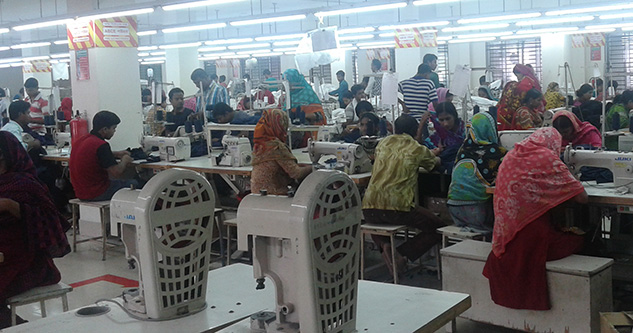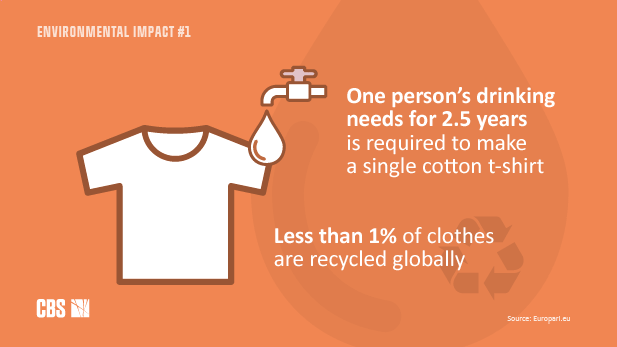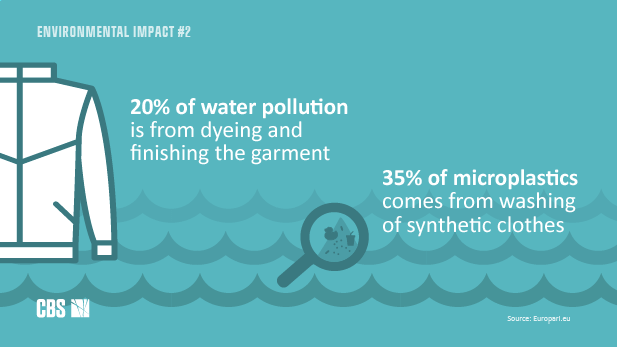Green Transition: Climate change and the textile industry

Photo: Imranul Hoque
With garment/textile value chains now being reconfigured by the effects of climate change, a new four-year CBS-led research and capacity building project will use cutting-edge social science methods to investigate what will be required to transform the industry towards a net-zero future.
“Our main research objective is to bridge the global value chain and climate change analysis by generating new insights and knowledge into the actors pushing for decarbonisation, value chain resilience and adaptation in the garment and textile industries of Europe and Bangladesh,” says lead investigator Professor Peter Lund-Thomsen, Centre for Business and Development Studies at CBS. The project is supported by the Danish Council for Development Research, Danida, with a grant of approximately DKK 12 million.
The project will involve other Danish partners, Aalborg University and Roskilde University, along with the Danish Ethical Trade Initiative and Dansk Fashion and Textile. The project partners in Bangladesh will be BRAC University and the University of Dhaka.

Europe and Bangladesh
The European Parliament states that the amount of clothing bought in the EU per person has increased by 40% over the last 25 years following a sharp fall in prices, which has reduced the life span of clothing. While every year Europeans use nearly 26 kilos of textiles and discard about 11 kilos of them.
According to the International Finance Corporation, a member of the World Bank Group, the garment industry in Bangladesh has seen a 79% rise in annual revenue over the past seven years and today is the second largest exporter in the world, with the sector accounting for 80% of the country’s total export earnings.
Clothing in general has complex supply chains, including how the clothing is transported and disposed of. This project will focus on what are the drivers and barriers to their engagement in this green transition, the scope of their practices, experimentation and collaboration and the consequences for economic, social, and environmental upgrading in Bangladesh.
The project will examine what brands, suppliers, workers, and government officials and other stakeholders perceive as the consequences for economic, social, and environmental upgrading in supplier facilities of decarbonisation and efforts to build climate-related resilience and adaptation into the global textile/garment value chain.
“Currently many industry stakeholders in Bangladesh are struggling to deal with the fallout from COVID-19 and so addressing and dealing with the additional issue of climate change will be a tough challenge,” adds Lund-Thomsen.
Mitigation and adaptation
Climate mitigation is generally perceived as a Northern concern amongst industrialists and government policymakers in Asia, as rich industrialised nations are amongst the largest net CO2 emitters.
The project will focus on the decarbonisation efforts, but equally and more importantly, will examine the adaption efforts from a Bangladesh perspective as climate change is driving farmers off their land, towards jobs in the cities and into the garment industry, while at the same time factories are facing the consequences of more floods and rising sea levels.
“This constitutes a major policy challenge in Bangladesh, where decarbonisation is sometimes seen as a “problem” of the West and concerns who should also pay the price, i.e., the polluter pays principle. Consequently, how to secure existing infrastructure and avoid supply chain disruptions – flooding of roads and ports – represents a critical challenge in Bangladesh,” states Lund-Thomsen.
“The introduction of new production technologies and greener energy sources will remain crucial, but who will pay the price is an important political issue,” he adds.

Research methods
“Our main objective in terms of strengthening research will be to substantially increase the ability of PhD scholars and junior and senior researchers in Bangladesh to engage in high quality research at the interface between global value chains and climate change that advances scientific knowledge and is published in leading international journals," says Lund-Thomsen.
The project will use a paradigmatic case study approach and value chain mapping and analysis. “We will probe the underlying motives of actors engaged in climate change mitigation and adaptation efforts. In addition to reviewing national and international laws and policy directives related to climate mitigation and the circular economy we will talk to diverse actors about the scope of their emissions and their practices,” he adds.
This will be complemented by on-site visits to product design departments, recycling facilities, outlet stores, factory sites and NGOs that recycle clothes. Finally, the researchers will participate in the online working groups of the UNFCCC Fashion Industry Charter on Climate Action that involve fashion brands, suppliers, think tanks, NGOs and other stakeholders working together to explore the challenges and solutions to decarbonising the global fashion industry.
“The goal for this project is to create a better knowledge base for decision-making amongst government policymakers, international organisations, brands, retailers, suppliers and other actors interested in facilitating the transformation of the industry towards net zero,” concludes Professor Peter Lund-Thomsen.
For further information about the project, please contact Peter Lund-Thomsen pl.msc@cbs.dk